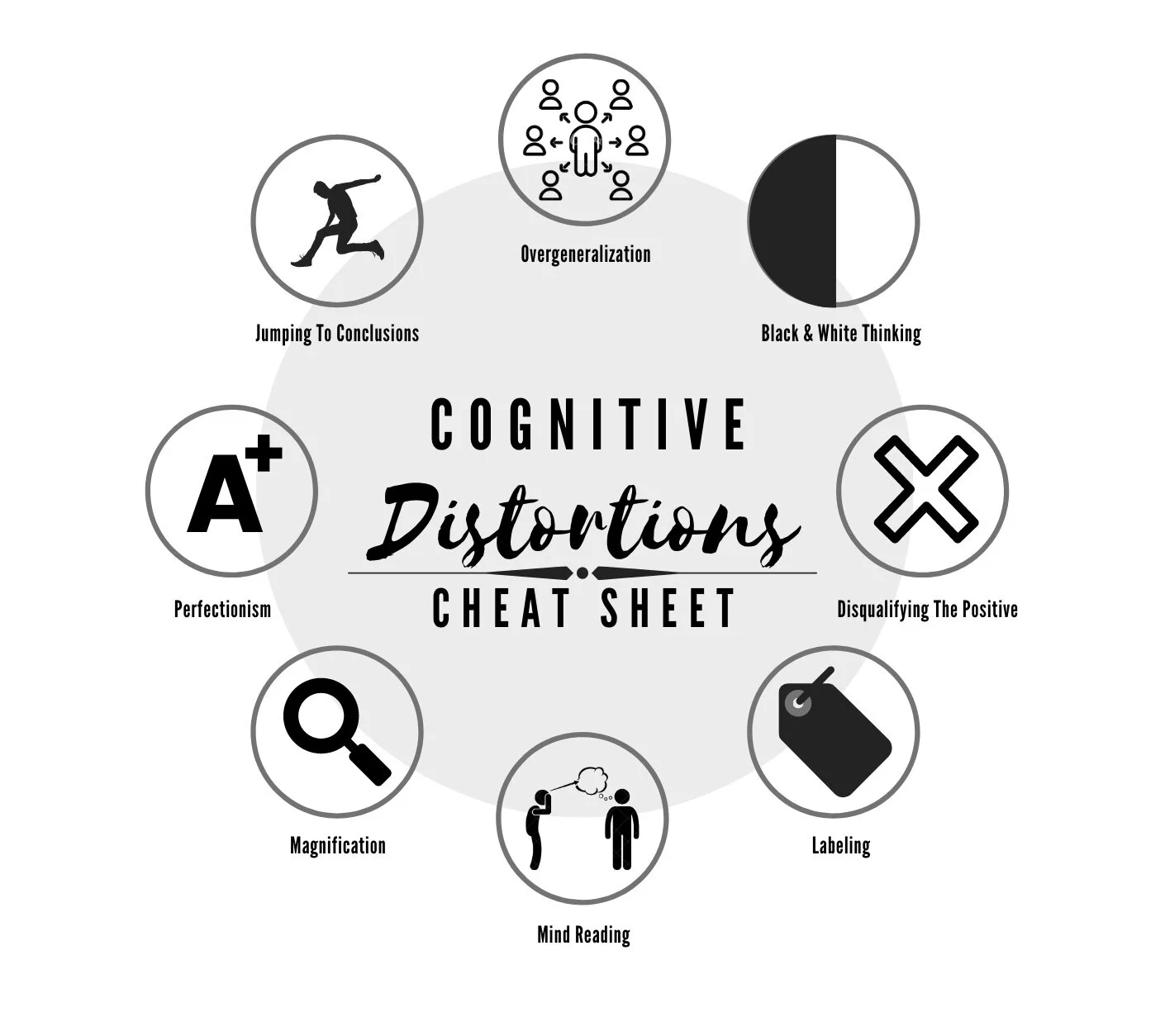
Challenging Negative Inner Voices
Module II | Session Two
Overview
M2 | Session Two: Challenging Negative Inner Voices
|
Cognitive Distortions
Your Emotional Process
Session Skill: Situation Practice
Depression and You
|
What Is A Cognitive Distortion?
Cognitive Distortions are habitual errors in thinking. It is the interpretation of life events in a persistently negative way. If cognitive distortions are reinforced often enough, they can cause increased mental health issues, such as anxiety, depression, and trauma-related difficulties.

Why Do Cognitive Distortions Matter?
Cognitive Distortions
Research suggests that people develop cognitive distortions as a way of coping with adverse life events.
The more prolonged and severe those adverse events are, the more likely it is that one or more cognitive distortions will form.
Stress could cause people to adapt their thinking in ways that are useful for their immediate survival.
Thought adaptations for the sake of survival aren’t rational or healthy long-term.
Cognitive distortions are the product of unhealthy core beliefs
Our core beliefs are fueled by our cognitive distortions.
Source: Healthline
Cognitive Distortions
There are several distinct unhelpful thinking styles or negative biases in thinking, known as cognitive biases.
|
Jumping to Conclusions
Jumping to conclusions is where we make assumptions based on events or observations without confirming them. For example, if a coworker doesn't smile at me, my conclusion is that they hate me or are upset at me for something.
Catastrophizing
(Magnification/Minimization)
This mental distortion enlarges negative issues and minimizes positive ones. When dealing with this, we may diminish or disregard an award or recognition received, but then focus on a single piece of negative feedback, enlarging it into a catastrophe.
Black-and-White Thinking
This we commonly refer to as "all-or-nothing" thinking. Here, we view everything rigidly - either it is or it isn't. We're good or bad, smart or dumb, pretty or ugly, with no room in between. This can create anxiety by making situations all good or all bad, quickly giving us reason to worry when something falls the slightest bit short of perfection.
Disqualifying the Positive
Disqualifying the positive means setting aside positive feedback or events we may experience or observe. For example, I know I'm doing well in these classes, but that doesn't matter because I am doing poorly in this one class.
Emotional Reasoning
Emotional reasoning is using our emotions as evidence that something is a certain fact.
For example, feeling jealous in a relationship might serve as unequivocal evidence that the significant other is in fact cheating.
Labeling
Also known as mislabeling, in this pattern, we advance our overgeneralizing all the way to giving definitive labels to ourselves or others. If I fail a test, I must be "stupid", "worthless", or "a huge idiot". Usually these labels are pretty intense and carry a lot of emotional weight.
Mind Reading
The inaccurate belief that we know what another person is thinking. This distortion refers to the negative interpretations that we jump to. For example, seeing a stranger with an unpleasant expression, you jump to the conclusion that they are thinking something negative about you.
Overgeneralization
This sneaky distortion takes one instance or example and generalizes it to an overall pattern.
For example, a student may receive a C on one test and conclude that she is stupid and a failure.
Perfectionism
Perfectionists and those struggling with Imposter Syndrome will recognize this distortion – it is the belief that we must always do things perfectly or not at all. For those struggling with this distortion, the idea of having any imperfections in ourselves or our work is absolutely unacceptable, and we will criticize ourselves or others intensely.
Personalization/Blaming
Personalizing is assigning blame to yourself or others for numerous things that are generally unrelated. For example, if a family dinner went poorly, you might blame yourself for something unrelated like bringing the wrong dressing.
World Fallacy
These are beliefs of how the world is or should be. Fallacies of fairness, control, change or reward are intended to add order and try to exert control on a unruly world. Believing that life should be fair, or that we can change or control others by our behavior, will result in feelings of anger, resentment, and hopelessness when one inevitably encounters reality.
“Should” ism
"Should-ing" is what we call focusing on the "should" - what I should be like, how my situation or job should be, what my friends should say. This is essentially comparing yourself or others to a perfect expectation.
Source: American Journal of Psychotherapy
Session Skill
Map out your emotional process, using the emotion processing examples above. Using a recent upsetting event fill in your actual reactions and alternate reaction below.
Situation Practice
Complete the following practice activity to break down your mental and emotional reactions to situations. As you go throughout your day, try to observe what you notice in what thoughts and emotions come up in your reactions to situations. Write your answers on paper or in a designated note.
|
Situation
State A Situation:
Think of an event, current or past, that you would like to examine more deeply.
|
Thoughts
Name Your Thoughts + Thought Distortion:
What do/did you think about this situation?
|
Emotions
Name Your Feelings:
What emotions come up as a result of that thought?
|
Behaviors
Name Your Behaviors:
Name what behaviors you engage in after you experience these emotions.
